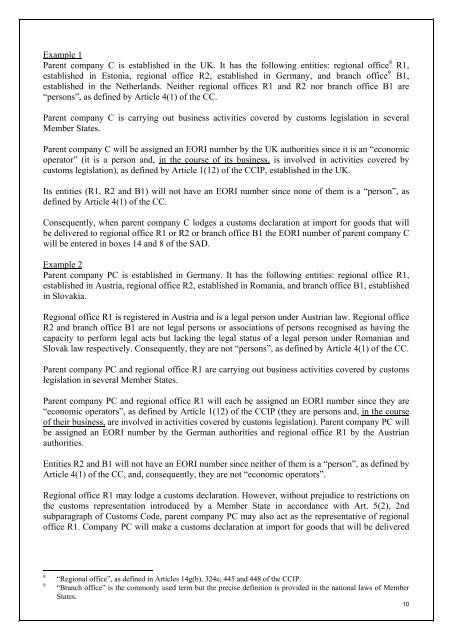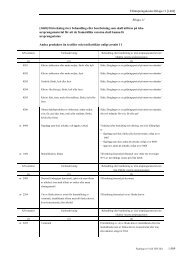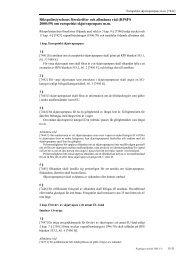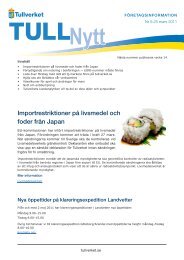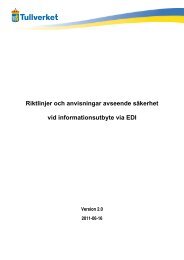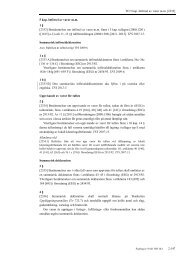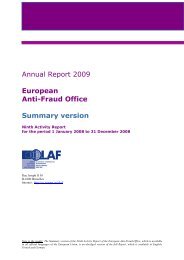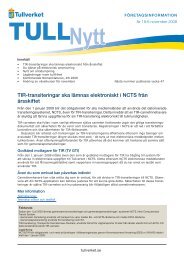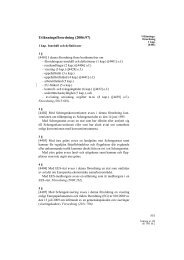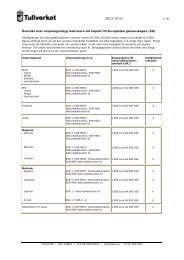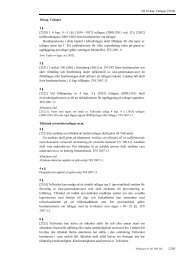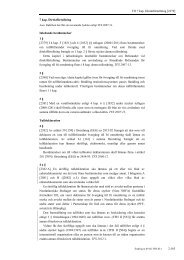EORI Guidelines - European Commission - Europa
EORI Guidelines - European Commission - Europa
EORI Guidelines - European Commission - Europa
You also want an ePaper? Increase the reach of your titles
YUMPU automatically turns print PDFs into web optimized ePapers that Google loves.
Example 1Parent company C is established in the UK. It has the following entities: regional office 8 R1,established in Estonia, regional office R2, established in Germany, and branch office 9 B1,established in the Netherlands. Neither regional offices R1 and R2 nor branch office B1 are“persons”, as defined by Article 4(1) of the CC.Parent company C is carrying out business activities covered by customs legislation in severalMember States.Parent company C will be assigned an <strong>EORI</strong> number by the UK authorities since it is an “economicoperator” (it is a person and, in the course of its business, is involved in activities covered bycustoms legislation), as defined by Article 1(12) of the CCIP, established in the UK.Its entities (R1, R2 and B1) will not have an <strong>EORI</strong> number since none of them is a “person”, asdefined by Article 4(1) of the CC.Consequently, when parent company C lodges a customs declaration at import for goods that willbe delivered to regional office R1 or R2 or branch office B1 the <strong>EORI</strong> number of parent company Cwill be entered in boxes 14 and 8 of the SAD.Example 2Parent company PC is established in Germany. It has the following entities: regional office R1,established in Austria, regional office R2, established in Romania, and branch office B1, establishedin Slovakia.Regional office R1 is registered in Austria and is a legal person under Austrian law. Regional officeR2 and branch office B1 are not legal persons or associations of persons recognised as having thecapacity to perform legal acts but lacking the legal status of a legal person under Romanian andSlovak law respectively. Consequently, they are not “persons”, as defined by Article 4(1) of the CC.Parent company PC and regional office R1 are carrying out business activities covered by customslegislation in several Member States.Parent company PC and regional office R1 will each be assigned an <strong>EORI</strong> number since they are“economic operators”, as defined by Article 1(12) of the CCIP (they are persons and, in the courseof their business, are involved in activities covered by customs legislation). Parent company PC willbe assigned an <strong>EORI</strong> number by the German authorities and regional office R1 by the Austrianauthorities.Entities R2 and B1 will not have an <strong>EORI</strong> number since neither of them is a “person”, as defined byArticle 4(1) of the CC, and, consequently, they are not “economic operators”.Regional office R1 may lodge a customs declaration. However, without prejudice to restrictions onthe customs representation introduced by a Member State in accordance with Art. 5(2), 2ndsubparagraph of Customs Code, parent company PC may also act as the representative of regionaloffice R1. Company PC will make a customs declaration at import for goods that will be delivered89“Regional office”, as defined in Articles 14g(b), 324e, 445 and 448 of the CCIP.“Branch office” is the commonly used term but the precise definition is provided in the national laws of MemberStates.10


